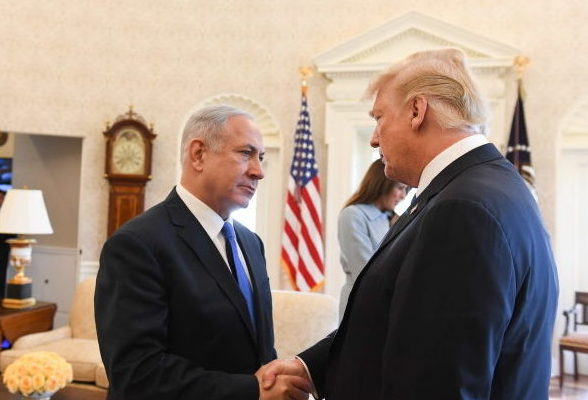With no map yet and civil unrest occupying the Trump administration, major hurdles may push off annexation despite the July 1 deadline.
By Paul Shindman, World Israel News
Israeli experts from across the political spectrum expressed doubt on Wednesday that Prime Minister Benjamin Netanyahu would be able to fulfill his goal of annexing Israeli settlements on July 1.
The issue of applying Israeli sovereignty over Jewish settlements in Judea and Samaria, including those in the Jordan Valley, has been on the agenda for years, but got a boost under the peace plan unveiled earlier this year by President Donald Trump.
With the apparent blessing of American officials, Netanyahu set a July 1 date for annexing the settlements as part of the national unity government agreement.
But like everything else in the Middle East, it’s complicated–so much so that there are doubts Israel will be able to meet that July 1 goal.
“The best thing that Netanyahu can do in this complicated reality is to announce his intention to annex and establish a manager who will discuss the details to buy time,” wrote Yossi Melman in Haaretz.
With the American and Arab responses to annexation of paramount importance and experts predicting an eruption of Palestinian violence if annexation goes ahead, Melman speculated that only three people have enough influence to persuade Netanyahu to put off the decision.
He ruled out Defense Minister Benny Gantz and Foreign Minister Gabi Ashkenazi, saying the two leaders of the Blue and White Party “have so far demonstrated slackness and almost complete surrender to all of Netanyahu’s dictates.”
“The three are Saudi Crown Prince Muhammad bin Salman; Jared Kushner, son-in-law and adviser to U.S. President Donald Trump; and head of the Mossad Yossi Cohen,” Melman said, noting that the influential Saudi leader has the ear of Kushner and also sets the tone in much of the Arab world.
While Cohen supports annexation, as Mossad chief he regularly assesses Israel’s security position and would have to let Netanyahu know if annexation in July would compromise Israel’s security.
Kushner and Netanyahu spoke on the phone Monday and it is apparent that between the coronavirus crisis and the civil unrest following the death of George Floyd, the United States may not be interested in more controversy.
Netanyahu himself reaffirmed in a tweet on Tuesday “his commitment to conduct negotiations based on the Trump plan” and said that “the discussions with the Americans were still continuing.”
Israel’s economy is still reeling from the coronavirus pandemic with one in four Israelis out of work.
Imposing the annexation move could easily spark violence, said Middle East analyst Shimrit Meir.
“One look at the images emerging from the streets of Minneapolis, New York, and Washington D.C. in recent days shows how uprisings can erupt in a split second – in [Judea and Samaria] as well as anywhere else in the world,” Meir wrote on Ynet.
“The current [Trump] administration is now considering whether navigating Israel’s political extremes is worth the trouble in the midst of its own national emergency,” Meir said. “How, when police are clashing with protesters on streets all over the country, can Jared Kushner have time to listen to Israelis argu[ing]?”
One of the other problems is that except for Netanyahu and a handful of confidants, nobody knows which settlements will be included and which will be left out. The settlers are concerned that the U.S. plan results in 19 Israeli enclaves becoming surrounded by a future Palestinian state on all sides, leaving their only connection to other Israeli towns via a narrow access road. There are estimated to be around 20,000 settlers living in those communities.
However, the joint American-Israeli mapping committee has not finished its work, and a key member of that committee, American security expert Scott Leith, has not been able to travel to the region since the outbreak of the coronavirus pandemic, Times of Israel reported, noting it is doubtful the mapping work will be finished by July 1.
Although Netanyahu has the support of some of the Yesha Settlers Council, others reject the annexation deal under the Trump plan because the Americans are calling for an eventual Palestinian state. Efrat Mayor Oded Revivi supports annexation with the Trump conditions, while Samaria Regional Council Chairman Yossi Dagan wants Netanyahu “to apply sovereignty immediately, with or without the United States’ consent.”
“We will stand vehemently and clearly against the establishment of a terrorist state in the heart of the State of Israel,” Dagan said.
The settler leaders said Netanyahu told them that a different peace plan by a different administration would require Israel to remove settlements. The leaders responded by saying: “We would rather swim in sewage than drown in freshwater.”





